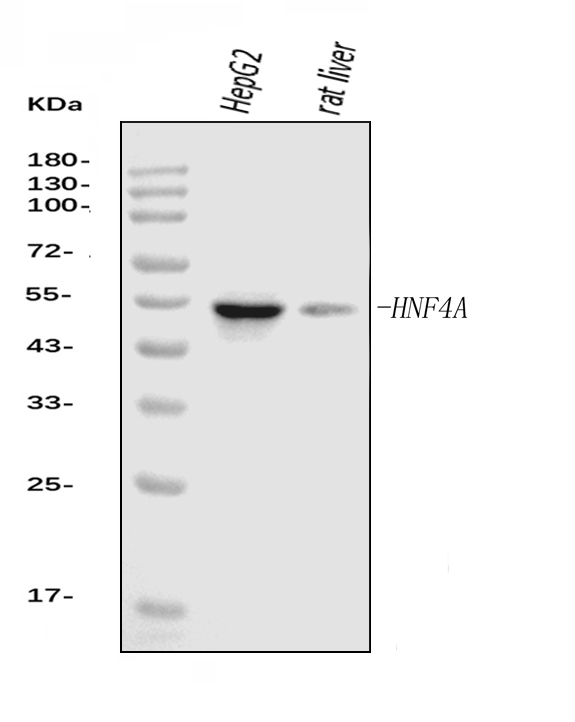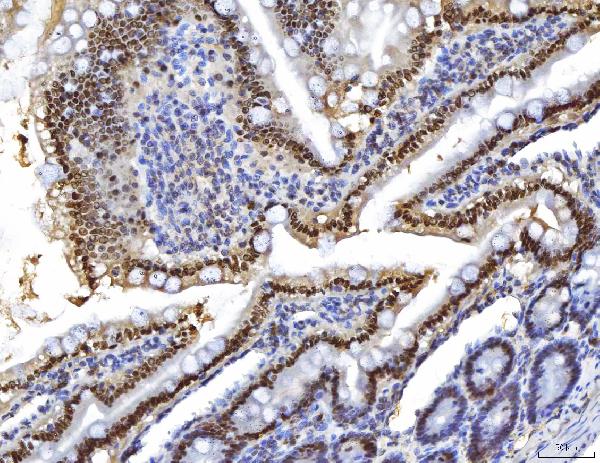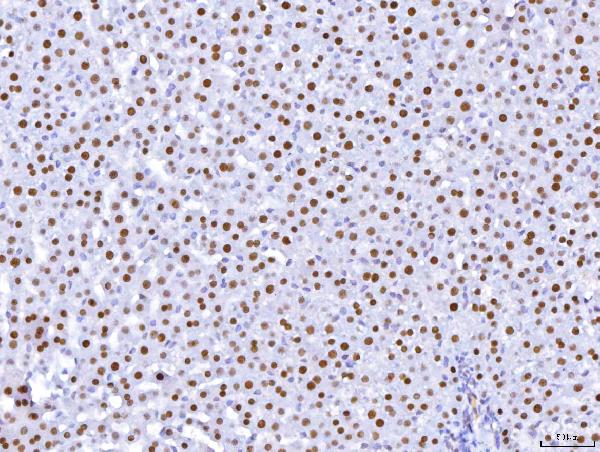Anti-HNF-4-alpha Antibody Picoband™ (monoclonal, 6C8E9)
- SPECIFICATION
- CITATIONS
- PROTOCOLS
- BACKGROUND

Application
| WB, IHC |
|---|---|
| Primary Accession | P41235 |
| Host | Mouse |
| Isotype | Mouse IgG2a |
| Reactivity | Rat, Human |
| Clonality | Monoclonal |
| Format | Lyophilized |
| Description | Anti-HNF-4-alpha Antibody Picoband™ (monoclonal, 6C8E9) . Tested in IHC, WB applications. This antibody reacts with Human, Rat. |
| Reconstitution | Adding 0.2 ml of distilled water will yield a concentration of 500 µg/ml. |
| Gene ID | 3172 |
|---|---|
| Other Names | Hepatocyte nuclear factor 4-alpha, HNF-4-alpha, Nuclear receptor subfamily 2 group A member 1, Transcription factor 14, TCF-14, Transcription factor HNF-4, HNF4A, HNF4, NR2A1, TCF14 |
| Calculated MW | 53 kDa |
| Application Details | Western blot, 0.25-0.5 µg/ml, Human, Rat Immunohistochemistry(Paraffin-embedded Section), 2-5 µg/ml, Rat |
| Contents | Each vial contains 4 mg Trehalose, 0.9 mg NaCl and 0.2 mg Na2HPO4. |
| Clone Names | Clone: 6C8E9 |
| Immunogen | E.coli-derived human HNF-4-alpha recombinant protein (Position: Q164-I474). Human HNF-4-alpha shares 95% and 96% amino acid (aa) sequence identity with mouse and rat HNF-4-alpha, respectively. |
| Purification | Immunogen affinity purified. |
| Storage | At -20°C for one year from date of receipt. After reconstitution, at 4°C for one month. It can also be aliquotted and stored frozen at -20°C for six months. Avoid repeated freezing and thawing. |
| Name | HNF4A |
|---|---|
| Synonyms | HNF4, NR2A1, TCF14 |
| Function | Transcriptional regulator which controls the expression of hepatic genes during the transition of endodermal cells to hepatic progenitor cells, facilitating the recruitment of RNA pol II to the promoters of target genes (PubMed:30597922). Activates the transcription of CYP2C38 (By similarity). Represses the CLOCK-BMAL1 transcriptional activity and is essential for circadian rhythm maintenance and period regulation in the liver and colon cells (PubMed:30530698). |
| Cellular Location | Nucleus. |

Thousands of laboratories across the world have published research that depended on the performance of antibodies from Abcepta to advance their research. Check out links to articles that cite our products in major peer-reviewed journals, organized by research category.
info@abcepta.com, and receive a free "I Love Antibodies" mug.
Provided below are standard protocols that you may find useful for product applications.
Background
Hepatocyte nuclear factor 4 alpha (HNF4A), also known as NR2A1, is a nuclear receptor that in humans is encoded by the HNF4A gene. It is mapped to 20q13.12. HNF4A is a nuclear transcription factor that binds DNA as a homodimer. The encoded protein controls the expression of several genes, including hepatocyte nuclear factor 1 alpha, a transcription factor which regulates the expression of several hepatic genes. This gene plays a role in development of the liver, kidney, and intestines. HNF4A is required for the PXR and CAR-mediated transcriptional activation of CYP3A4. This gene also plays a pivotal role in the expression and synthesis of SHBG, an important glycoprotein made primarily in the liver, which in addition to lowering insulin-resistance also serves in reducing levels of free Oestrogen as-well as prolonging the half-life of Testosterone.
If you have used an Abcepta product and would like to share how it has performed, please click on the "Submit Review" button and provide the requested information. Our staff will examine and post your review and contact you if needed.
If you have any additional inquiries please email technical services at tech@abcepta.com.













 Foundational characteristics of cancer include proliferation, angiogenesis, migration, evasion of apoptosis, and cellular immortality. Find key markers for these cellular processes and antibodies to detect them.
Foundational characteristics of cancer include proliferation, angiogenesis, migration, evasion of apoptosis, and cellular immortality. Find key markers for these cellular processes and antibodies to detect them. The SUMOplot™ Analysis Program predicts and scores sumoylation sites in your protein. SUMOylation is a post-translational modification involved in various cellular processes, such as nuclear-cytosolic transport, transcriptional regulation, apoptosis, protein stability, response to stress, and progression through the cell cycle.
The SUMOplot™ Analysis Program predicts and scores sumoylation sites in your protein. SUMOylation is a post-translational modification involved in various cellular processes, such as nuclear-cytosolic transport, transcriptional regulation, apoptosis, protein stability, response to stress, and progression through the cell cycle. The Autophagy Receptor Motif Plotter predicts and scores autophagy receptor binding sites in your protein. Identifying proteins connected to this pathway is critical to understanding the role of autophagy in physiological as well as pathological processes such as development, differentiation, neurodegenerative diseases, stress, infection, and cancer.
The Autophagy Receptor Motif Plotter predicts and scores autophagy receptor binding sites in your protein. Identifying proteins connected to this pathway is critical to understanding the role of autophagy in physiological as well as pathological processes such as development, differentiation, neurodegenerative diseases, stress, infection, and cancer.




